Medication-Nutrient Interaction Checker
Select a medication above to see how it may affect your nutrient absorption.
Quick Takeaways
- Many common drugs can block or speed up the uptake of vitamins and minerals.
- Antacids, PPIs, metformin, and diuretics are the top culprits.
- Calcium, iron, vitaminB12, magnesium and potassium are most often affected.
- Timing your meds and meals, or adding a supplement, usually fixes the problem.
- Talk to your prescriber before you make any changes.
When you take medications drugs prescribed or bought over the counter to treat or prevent disease, they can change how your body pulls nutrients essential vitamins and minerals from the foods you eat. This isn’t a myth; it’s a chemistry‑driven reality that can show up as fatigue, bruising, or a sudden need for extra supplements.
Why Drugs Touch Digestion
Most medicines travel through the stomach and small intestine-the same place where the bulk of nutrient absorption happens. A drug may:
- Alter the stomach’s pH, changing how minerals dissolve.
- Bind directly to a nutrient, forming a complex the gut can’t absorb.
- Slow down gut motility, giving nutrients less time to be taken up.
- Influence gut bacteria, which help release certain vitamins.
Because the gut is a busy highway, even a small detour caused by a pill can lead to a noticeable loss over weeks or months.
Drug Classes That Play With Specific Nutrients
Below is a quick snapshot of the most frequent pairings.
| Drug Class | Key Nutrient Affected | Typical Effect | Simple Work‑around |
|---|---|---|---|
| Antacids | Calcium | Reduced calcium uptake due to higher stomach pH. | Take calcium supplement 2h after antacid. |
| Proton Pump Inhibitors (PPIs) | VitaminB12 | Less B12 released from food proteins. | Consider B12 injection or sublingual form. |
| Metformin | VitaminB12 | Long‑term use depletes B12 stores. | Check B12 levels annually; supplement if low. |
| Diuretics | Magnesium & Potassium | Increased urinary loss. | Eat potassium‑rich foods or take a balanced electrolyte supplement. |
| Broad‑spectrum Antibiotics | Iron | Gut bacteria that aid iron absorption are wiped out. | Space iron supplement 4h from antibiotic dose. |
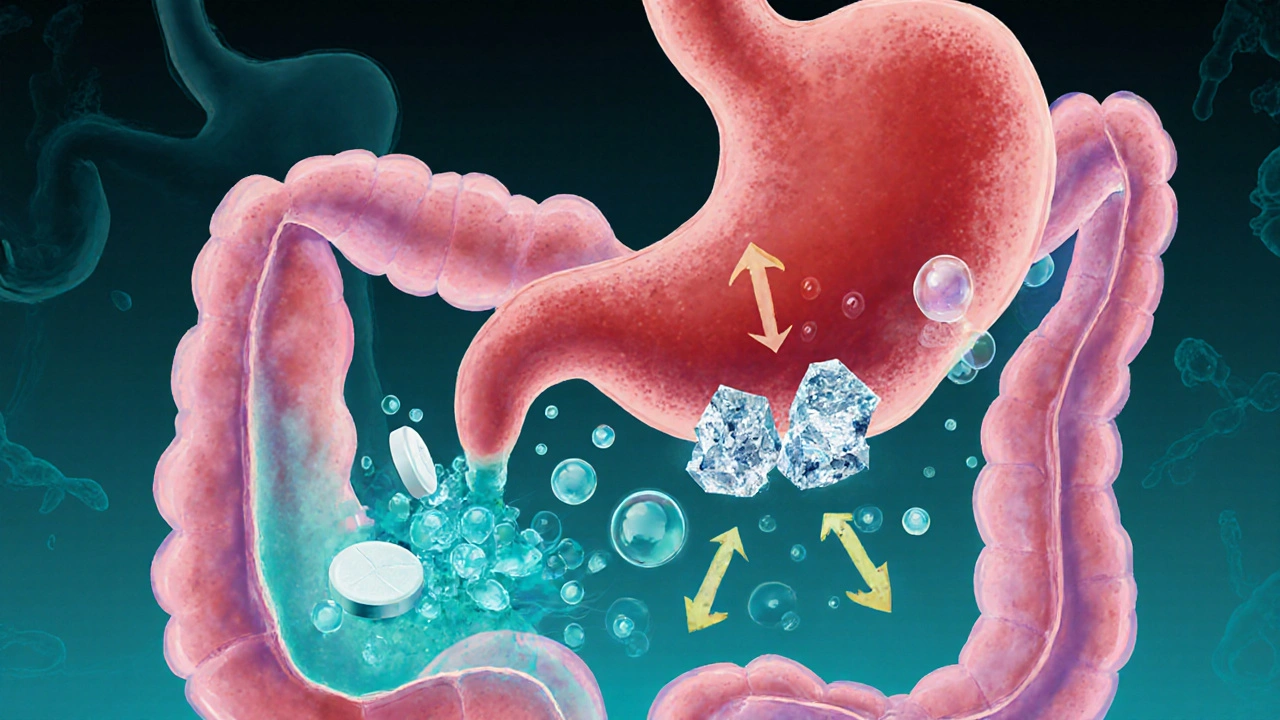
Digging Deeper: How Each Interaction Works
Antacids and Calcium - Antacids contain magnesium or aluminum hydroxide, which raise the stomach’s pH. Calcium salts need an acidic environment to dissolve. When the acid level drops, calcium stays in a solid form that the intestinal wall can’t pull through.
PPIs and VitaminB12 - PPIs like omeprazole keep the stomach “quiet” for weeks. B12 is attached to protein in food; it needs gastric acid to separate. Less acid means less free B12, eventually leading to anemia.
Metformin and VitaminB12 - Metformin interferes with the transport protein that shuttles B12 across the intestinal lining. The effect builds up, so patients on metformin for years often need a B12 check.
Diuretics and Magnesium/Potassium - Loop and thiazide diuretics increase urine output, flushing out electrolytes faster than the diet can replace them. Low magnesium can worsen muscle cramps, while low potassium may cause irregular heartbeat.
Antibiotics and Iron - Certain antibiotics (e.g., tetracyclines) bind iron in the gut, forming insoluble complexes. Even a short course can make iron‑rich meals less effective.
Practical Steps to Keep Nutrient Levels Healthy
- Timing is key. Separate the intake of the drug and the nutrient by at least two hours whenever possible.
- Choose the right formulation. Liquid calcium or chewable iron can bypass some pH‑related issues.
- Rotate when safe. If your doctor agrees, swapping an occasional PPI for an H2 blocker may reduce long‑term B12 loss.
- Get regular labs. Blood tests for B12, iron, magnesium and potassium are cheap and catch problems early.
- Talk diet. Foods rich in the at‑risk nutrient (e.g., leafy greens for magnesium) can offset mild deficits.
Checklist: Do You Need a Supplement?
- Are you on a PPI, antacid, or metformin for >6months? Yes → B12 test.
- Do you take a loop diuretic? Yes → Check potassium and magnesium.
- Recent course of antibiotics and iron‑rich diet? Yes → Space iron supplement.
- Experiencing unexplained fatigue, tingling, or muscle cramps? Yes → Order a full electrolyte panel.
When to Call Your Healthcare Provider
If you notice any of the following while on medication, schedule a visit:
- Persistent weakness or dizziness
- Unexplained bruising or bleeding
- Muscle twitches or heart palpitations
- Changes in skin or hair color (possible iron deficiency)
These symptoms often signal a nutrient shortfall that can be corrected without stopping the essential drug.

Frequently Asked Questions
Can I take my multivitamin at the same time as my medication?
Usually it’s safer to separate them. Most multivitamins contain calcium, iron or magnesium, which can bind to many drugs. A two‑hour gap is a good rule of thumb, but check the label or ask your pharmacist for the exact timing.
Do over‑the‑counter supplements interfere with prescription drugs?
Yes. Calcium carbonate tablets, zinc lozenges, and high‑dose vitaminC are common offenders. The same binding rules apply, so treat them like any other medication when planning meals.
Is it safe to stop my PPI to improve B12 absorption?
Never stop a prescription on your own. If B12 levels are low, your doctor might suggest a short taper, a switch to an H2 blocker, or a periodic B12 injection while you stay on the PPI.
How often should I test my electrolytes if I’m on a diuretic?
A baseline test before starting, then every three to six months, or sooner if you feel muscle cramps, fatigue, or irregular heartbeat.
Can diet alone fix the nutrient loss caused by medications?
For mild deficits, a balanced diet rich in the missing nutrient often suffices. Severe or chronic depletion usually requires a targeted supplement, guided by blood test results.
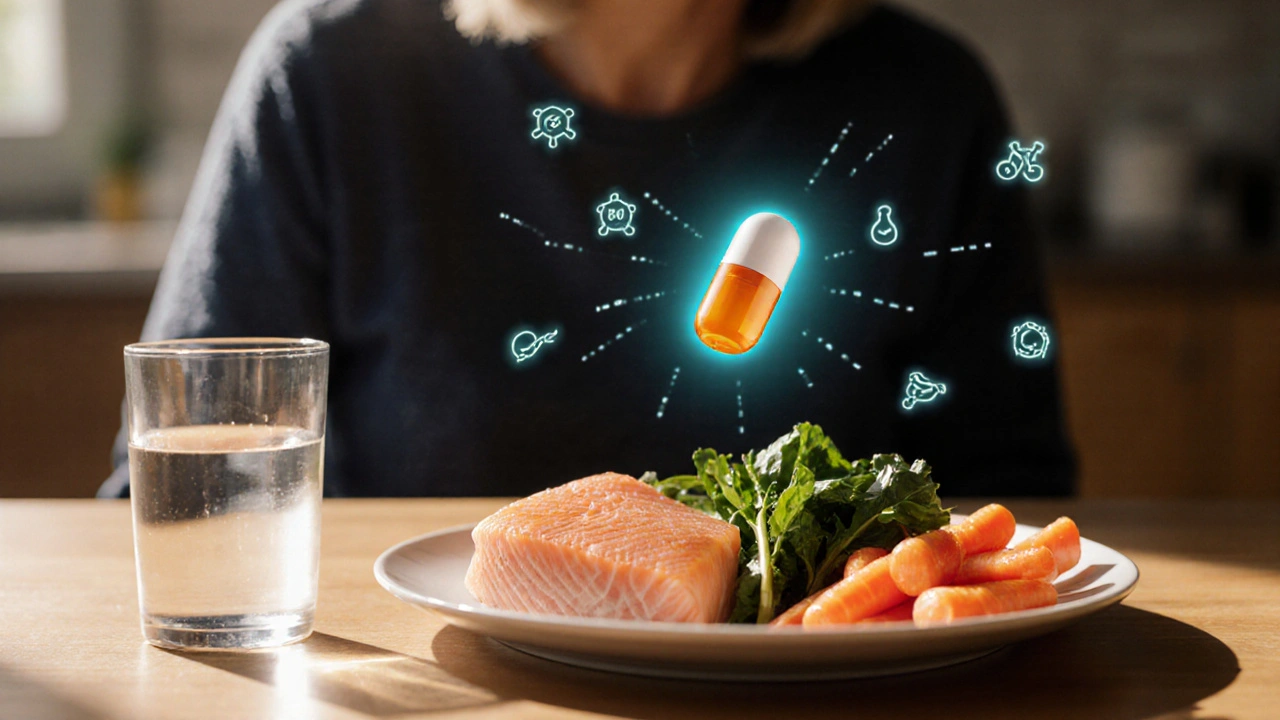

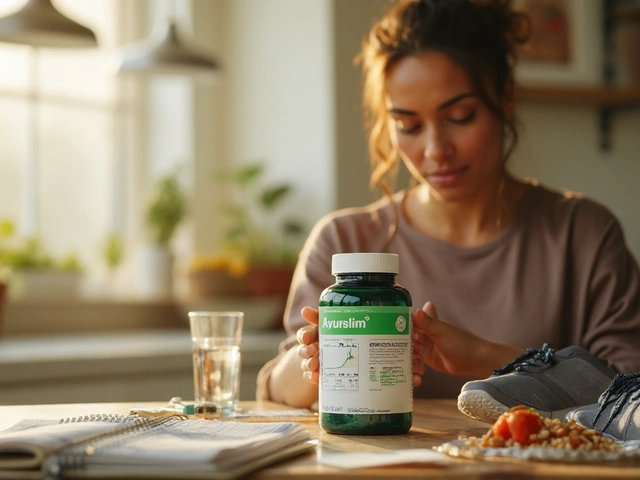
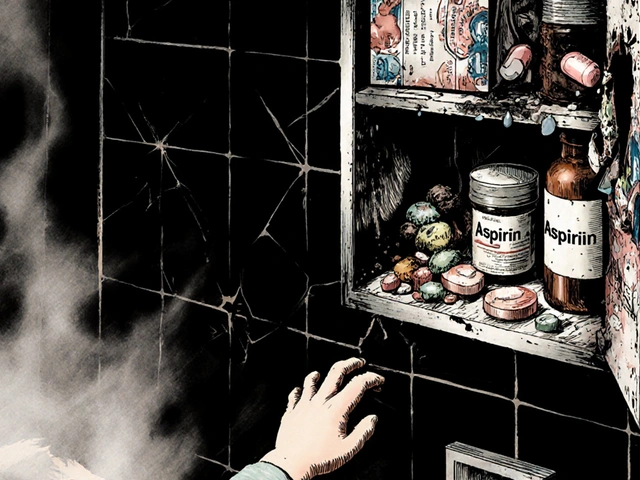
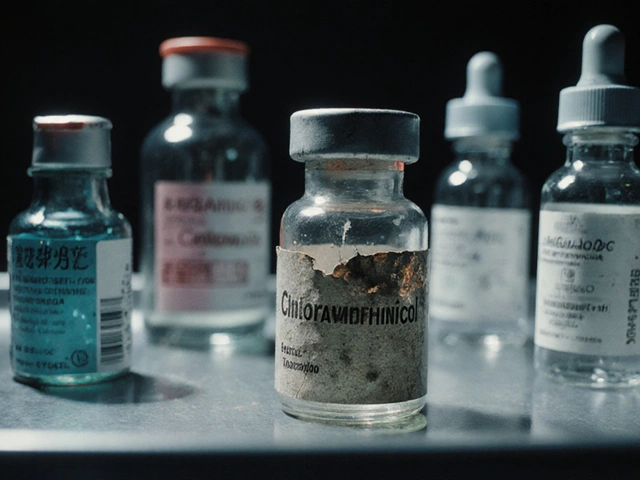

James Knight
October 4, 2025 AT 14:02Looks like the pharma industry just swapped your vitamins for a side hustle. Meds chew up calcium, B12, and electrolytes while they’re busy "fixing" whatever you have. You end up feeling tired, bruised, or jittery and blame yourself. The truth? They're cash cows, not nutrition gurus.
Laneeka Mcrae
October 8, 2025 AT 22:02Separate your meds from supplements by at least two hours, otherwise they’ll bind together and your body won’t absorb the nutrients. It’s a simple timing trick that saves you from hidden deficiencies.
Robert Frith
October 13, 2025 AT 06:02Oi, mate, you think taking a PPI is no big deal? Nah, it’s like lockin’ the doors on your B12 supply, mate, and you’ll feel the whiff of anaemia down the line. Stop actin’ like it’s just a chewable and get a proper check, ya hear?
Albert Gesierich
October 17, 2025 AT 14:02Actually, the proper term is "proton pump inhibitor," and "locking the doors on B12" is a metaphor, not a literal action. While the sentiment is clear, precision matters when discussing pharmacology.
Brad Tollefson
October 21, 2025 AT 22:02Just a heads up: taking your diuretic in the morning and grabbing a banana later can net you enough potassium to keep cramps away. Small habit, big difference.
Paul van de Runstraat
October 26, 2025 AT 05:02Wow, who would've thought that potassium is in bananas? Next you'll tell us that water is wet. Thanks for the groundbreaking insight, superhero.
Suraj Midya
October 30, 2025 AT 13:02People must understand that self‑medicating without lab tests is irresponsible. If you ignore nutrient loss, you risk long‑term health damage, which is unacceptable.
ashish ghone
November 3, 2025 AT 21:02It's great that you dug up this interaction chart because most patients never realize how their daily pills can stealthily drain essential nutrients.
First, think about the gut as a bustling highway where every drug you swallow can create a detour for vitamins and minerals.
When you pop an antacid, the sudden rise in stomach pH literally locks calcium in a solid form that can't dissolve properly.
That means every cup of milk or fortified orange juice you drink may not give you the calcium you think you’re getting.
Proton pump inhibitors take the drama even further by silencing the acid needed to free vitamin B12 from protein.
Over months, this silent sabotage can lead to anemia, tingling sensations, and even memory fog.
Metformin, the workhorse for diabetes, quietly interferes with the transport proteins that shuttle B12 across the intestinal wall.
Regular check‑ups for B12 levels become a lifesaver for anyone on long‑term metformin therapy.
Diuretics act like a garden hose, flushing out potassium and magnesium faster than your diet can replace them, which is why leg cramps are so common.
The simple fix? Pair your diuretic dose with a potassium‑rich snack like an avocado or a handful of nuts, and consider a balanced electrolyte supplement if needed.
Broad‑spectrum antibiotics wipe out the gut bacteria that help iron absorption, turning a short course into a hidden iron deficiency risk.
Spacing your iron supplement at least four hours away from the antibiotic can preserve the iron's bioavailability.
Timing is the unsung hero here-most guidelines suggest a two‑hour gap between meds and nutrients, but individual needs may vary.
Don't forget that liquid formulations of calcium or chewable iron can sometimes bypass pH‑related issues altogether.
Ultimately, collaborating with your healthcare provider for regular labs is the smartest move; they can pinpoint deficiencies before they become symptomatic.
Stay proactive, keep a simple log of when you take meds and meals, and you’ll outsmart the silent nutrient thieves. 😊
steph carr
November 8, 2025 AT 05:02Thanks for the thorough rundown! I’ll start logging my med times and add a potassium snack after my diuretic.
Vera Barnwell
November 12, 2025 AT 13:02Ever notice how the “big pharma” narrative never mentions these nutrient hacks? It’s because they want you dependent on their overpriced supplements, not your own food. The whole system is designed to keep you buying their fortified drinks while your meds silently rob you. Wake up and question who really benefits from the “quick fix” they push.
David Ross
November 16, 2025 AT 21:02Indeed, the interplay between pharmacokinetics, gastrointestinal pH, and micronutrient bioavailability is complex, yet often oversimplified; patients deserve clear, evidence‑based guidance, and clinicians should prioritize routine electrolyte panels, especially when prescribing long‑term acid‑suppressive therapy, or diuretic regimens, to preempt deficiencies before they manifest clinically.
Henry Seaton
November 21, 2025 AT 05:02Plain language works better, just tell them to get labs and watch for cramps.
Baby Thingie
November 25, 2025 AT 13:02Take calcium two hours after antacids to avoid absorption issues.